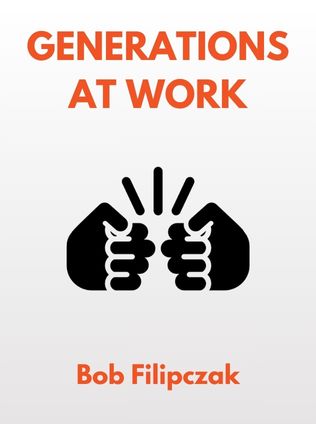
Generations at Work
Managing the Clash of Veterans, Boomers, Xers, and Nexters in Your Workplace
By Bob Filipczak,
Published 10/1999
Generations at Work: Managing the Clash of Veterans, Boomers, Xers, and Nexters in Your Workplace
By Ron Zemke, Claire Raines, and Bob Filipczak
About the Authors
Ron Zemke is a senior editor of Training magazine and president of Performance Research Associates. He has authored or coauthored 23 books. Claire Raines is a nationally recognized expert on generational issues and author of "Beyond Generation X." Bob Filipczak is a writer and honorary member of Generation X.
Main Idea
"Generations at Work" addresses the challenges and opportunities of managing a workplace with diverse age groups. It provides insights into understanding and bridging generational gaps, offering strategies to foster a productive and harmonious work environment. The book profiles four generations—Veterans, Boomers, Xers, and Nexters—and explores their unique characteristics, motivations, and contributions to the workplace.
Table of Contents
- Introduction: The Players
- The Veterans
- The Baby Boomers
- Generation Xers
- Generation Nexters
- The Acorn Principles
- The Future
Introduction: The Players
The authors introduce the four generations in the workplace, spanning nearly 80 years of American history. Each generation brings distinct values, motivations, and expectations, shaping the workplace dynamics. The Veterans (1922-1943) are characterized by loyalty and respect for authority. Boomers (1943-1960) are known for their work ethic and drive for success. Xers (1961-1980) value flexibility and balance, while Nexters (1980-2000) are optimistic and tech-savvy.
The Veterans
The Veterans' influence on workplace culture is profound. They value civic pride, loyalty, and respect for authority. In leadership roles, Veterans tend to be directive, making decisions and delegating tasks. While they can adapt to modern team structures, they may find virtual teams challenging. Veterans respect experience and can provide valuable insights but may resist younger managers.
"The mind-set of Veterans has so dominated our culture that every other set of beliefs is compared to theirs." - Ron Zemke
To manage Veterans effectively, recognize their experience, provide clear instructions, and offer technology training with patience. Veterans also tend to value formal relationships and clear authority structures, so it's essential to acknowledge their contributions and involve them in decision-making processes when possible. Their formative experiences during times of national hardship, such as the Great Depression and World War II, have instilled in them a strong work ethic and a sense of duty and loyalty to their employers.
The Baby Boomers
Baby Boomers, born from 1946 to 1960, are a generation of achievers who value participation and spirit in the workplace. They invented the 60-hour work week and are passionate about their careers. Boomers seek opportunities to succeed, thrive on participative management, and appreciate public recognition and perks. They have a strong work ethic and are often seen as the driving force behind corporate growth and innovation. Boomers are also known for their idealism and willingness to challenge the status quo, traits that have significantly shaped modern corporate culture.
"Boomers have an almost Pavlovian tendency toward being driven." - Claire Raines
To keep Boomers engaged, provide job enrichment, stress learning and improvement, and offer stress-reducing perks. Boomers also appreciate having a voice in decision-making processes and being recognized for their contributions. By involving them in strategic planning and offering opportunities for professional development, managers can harness their enthusiasm and drive for the benefit of the organization. Boomers' formative experiences during the Civil Rights Movement, the Vietnam War, and the rise of consumer culture have influenced their values and attitudes toward work and leadership.
Sign up for FREE and get access to 1,400+ books summaries.
You May Also Like
How To Win Friends and Influence People
The All-Time Classic Manual Of People Skills
By Dale CarnegieQuiet: The Power of Introverts
The Power of Introverts in a World That Can't Stop Talking
By Susan CainThe Lean Startup
How Today's Entrepreneurs Use Continuous Innovation to Create Radically Successful Businesses
By Eric RiesWho Moved My Cheese?
An Amazing Way to Deal with Change in Your Work and in Your Life
By Spencer Johnson, M.D.Make Your Bed
Little Things That Can Change Your Life...And Maybe the World
By William H. McRaven



















